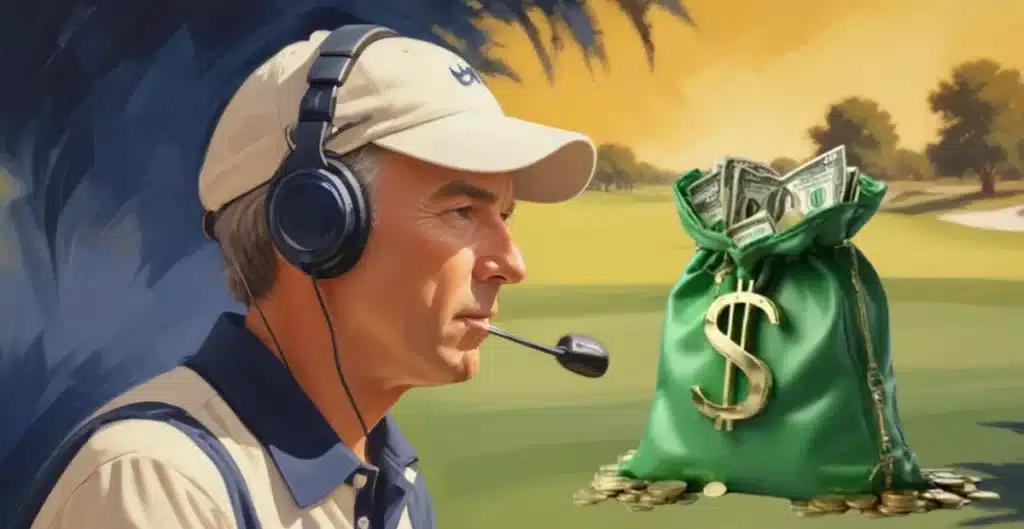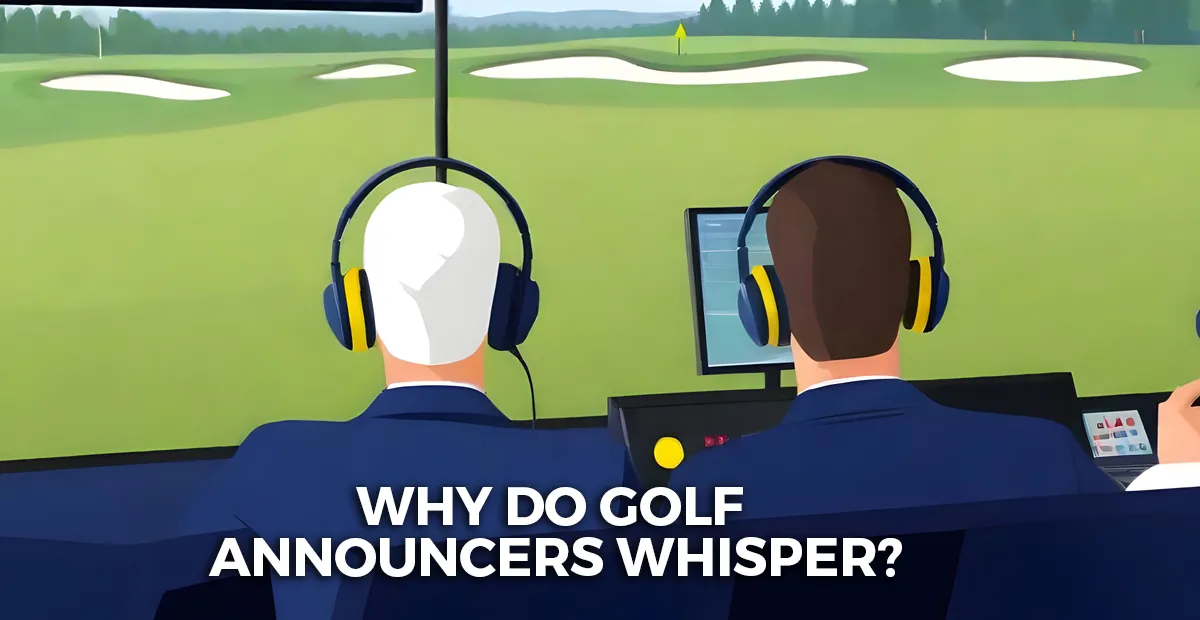- Why Do Golf Announcers Whisper?
- The Varieties of Golf Announcer Types
- What Effect Does Whispering Have on The Game?
- Does Noise Have An Affect On Golfer’s Performance?
- Who are Some of The Best Golf Announcers And Commentators?
- Why Are Golf Announcers So Old?
- How Much Do Golf Announcers And Commentators Make?
- The Tradition of Whispering in Golf
- Conclusion
- Frequently Asked Questions
“Why Do Golf Announcers Whisper?” is a unique characteristic that frequently draws viewers in the amazing world of golf. This guide explores the mystery behind the quiet voices that echo through the lush landscape and the players’ intense focus. This quiet seems to be required by the peaceful surroundings of golf courses and the serious looks on players’ faces.
We discussed the causes of this whispering phenomenon in golf commentary and considered how it affects the atmosphere of the game. “Why Do Golf Announcers Whisper?” becomes a lens through which we explore the special protocol and charm of this sport.
Why Do Golf Announcers Whisper?
“Why Do Golf Announcers Whisper?” The answer to this question lies in realizing how important it is to respect the focus and concentration that golfers require—a game known for its accuracy and insistence on quiet reflection. Noise disturbances, especially those that are loud, are not good in this situation.
Golf’s beautiful and serene course surroundings also call for a low key, preserving the sport’s naturally peaceful vibe. The whispering of the commentators is another example of the tradition and manners that are deeply embedded in the game of golf. This practice emphasizes decency, civility, and respect.
“Why Do Golf Announcers Whisper?” also discusses how this custom adds intimacy and drama to the game, giving viewers the impression that they are actually on the course and involved in its complex dynamics.
This whispering is made possible by technological advancements in broadcasting, such as directional microphones, which guarantee viewers’ clarity while maintaining the special and deferential atmosphere of golf.
The Varieties of Golf Announcer Types

There are many different kinds of golf announcers, and they all add a distinct flavor to the commentary and improve the viewing experience in different ways:
- During a golf broadcast, play-by-play announcers are the main voices heard. They give a thorough explanation of every shot, player movement, and course circumstances while describing the action live. It is their responsibility to inform the audience of the game’s current status.
- Color Commentators: By offering analysis, context, and firsthand knowledge, color commentators give the broadcast depth. Frequently ex-professional golfers or specialists in the field, they provide a more profound comprehension of the tactics and abilities involved, enhancing the audience’s experience with their wisdom and competence.
- Reporters on the Course: These announcers are dispersed throughout the golf course and frequently track particular player groups. They offer interviews, real-time insights, and updates from the front lines. They are able to provide a distinct viewpoint on the game’s events because of their close proximity to the action.
- Analysts: Usually working off-camera, analysts concentrate on the intricacies of the sport. They break down swings, combining techniques and game plans, and frequently use graphics and video replays to highlight key points. Their job is to help viewers comprehend the intricacies of golf by dissecting the game’s finer points.
- Interviewers: These presenters are experts at interviewing players, important figures in the tournament, and other parties both before and after rounds. By presenting players’ personalities, ideas, and feelings, they help humanize the sport and give the broadcast a more intimate feel.
- Anchor Hosts: Usually located in a studio or a designated area on the course, the anchors serve as the main characters in the broadcast. They introduce segments, direct the broadcast’s overall plot, and set the stage for other announcers to work inside.
- Like tennis, golf broadcasting demands silence from both viewers and commentators because players need to focus intently on their plays. There are three main categories of golf commentators, each having a special function and speech pattern:
- Announcers from the Main Studio-Booth: These announcers work from the main studio-booth, which is usually situated away from the players but close to the main clubhouse. They do not have to keep quiet because there is no chance of them upsetting the players with their location. Their responsibilities include narrating the main story of the action, using video feeds, and keeping in touch with the production team via headphones or earpieces to stay informed about the status of the game.
- Watch-Tower Announcers: Perched in makeshift buildings called “aeries,” these announcers keep an eye on particular holes. Frequently, their vantage point covers both their allotted hole and an adjoining one. These buildings are situated 20–30 feet above the green; they are not soundproof. Hence, in order to prevent being overheard when players are donning their green, these announcers must speak quietly so as not to disturb the players.
- Reporters on the move: These pundits travel the course, usually focusing on one group but also having the freedom to cover intriguing activities on other holes. They must remain silent at all times because they are frequently in close proximity to the players, especially when they are ten to twenty yards from the action.
- When reporting on players’ club decisions or strategies from a slight distance away, such as up the fairway, they might speak in hushed tones. They must, however, continue to be silent enough to avoid disturbing the players because their surroundings are typically very still and sounds travel far.
What Effect Does Whispering Have on The Game?
“Why Do Golf Announcers Whisper?” This query sheds light on the complex function whispering serves in golf broadcasting. Golf announcers’ whispering can actually have two effects on the game: it can calm things down while also increasing the level of excitement.
Whispering gives the broadcast a calming quality that is in line with the peaceful nature of golf. However, the mere act of whispering itself has the power to increase the intensity of the game. The viewers’ experience is improved by the suspense that is introduced by the announcers’ soft, whispery tones.
Golf may seem like a slow-moving or boring sport to some, but true enthusiasts are aware of the depth of skill and strategy required. This is where the question “Why Do Golf Announcers Whisper?” comes into focus. In this case, whispering is very important. It adds to the suspense and excitement building, keeping the audience interested on a deeper level.
Announcers are able to increase the tension and anticipation by whispering, which makes the game more interesting to watch. Consequently, “Why Do Golf Announcers Whisper?” is a tactical device that improves the overall spectacle of the game rather than merely being a question of manners or custom.
Does Noise Have An Affect On Golfer’s Performance?
Research studies shed light on the long-running controversy regarding how noise affects a golfer’s score. One such study, which examined how well golfers putted in noisy environments, produced some interesting results. Compared to players who played in quieter environments, golfers who were exposed to noise made noticeably fewer putts.
This data implies that noise does, in fact, have a detrimental effect on a golfer’s game. It emphasizes the rationale behind “Why Do Golf Announcers Whisper?” Golf announcers help create a more comfortable atmosphere for the players by speaking quietly.
Their whispering reflects a realistic grasp of the demands of the game, respecting the players’ need for focus and corroborated by the findings of similar studies.
The answer to the question, “Why Do Golf Announcers Whisper?” is thus driven by the need to uphold the optimal conditions for peak performance in addition to the inherent challenges of the game. It has nothing to do with manners or custom.
Who are Some of The Best Golf Announcers And Commentators?
There are many well-known personalities in the world of golf broadcasting, and they all contribute their special insights and knowledge to the commentary booth. The top five golf commentators and announcers who have had a big influence on the business are as follows:
- Jim Nantz: When it comes to CBS Sports’ coverage of golf, Jim Nantz is a household name in the sports broadcasting industry. Since 1985, Nantz has been a well-known voice in golf, contributing his knowledge to CBS’s coverage of college and NFL basketball in addition to this sport. He has become one of the most recognizable voices in golf thanks to his longevity and unique style.
- Johnny Miller: Since 1990, Johnny Miller, who is renowned for his perceptive commentary, has been a mainstay of NBC Sports’ coverage of golf. Miller had a strong golfing background prior to becoming a broadcaster, having won 25 times on the PGA Tour, which gave his analysis authority and nuance.
- Paul Azinger: Paul Azinger, who had a prosperous professional golf career, is now a golf analyst for Fox Sports, contributing his knowledge and experience to the network. He has been an integral part of Fox’s golf coverage since 2014 and writes for Golf Digest and Golf World.
- David Feherty: Known for his clever and lighthearted style, David Feherty is a popular choice among golf enthusiasts. Feherty, an 11-time winner of PGA Tour events, has been a staff member of CBS and Golf Channel since 1997 and provides a distinctive and lively take on the game.
- Ian Finch Baker: Ian Baker-Finch, a former professional golfer who is now a commentator for Golf Channel and CBS, brings a wealth of experience to his work. He began his broadcasting career in 1999 and has become one of the most reputable voices in sports. Baker-Finch shares his written observations for Golf Digest and Golf World as well.
Why Are Golf Announcers So Old?
Why Do Golf Announcers Look So Old? This query is related to another fascinating question about golf that begs answered: “Why Do Golf Announcers Whisper?” The customs and etiquette of the game, which place a high value on experience and a profound comprehension of golf’s subtleties, are frequently correlated with the age of golf announcers.
Much like the reason behind “Why Do Golf Announcers Whisper” is related to honoring the game’s need for concentration and the tranquil atmosphere of the course, older announcers contribute a wealth of knowledge and a sense of history to their commentary.
Whispering is a hallmark of golf broadcasting and is a skill that typically requires years of experience with the dynamics and subtleties of the game. In a similar vein, veteran announcers add depth and wisdom to the broadcast.
The answers to the questions “Why Do Golf Announcers Whisper?” and “Why Are Golf Announcers So Old?” reveal a respect for the history of the game as well as an appreciation of the breadth of experience-based knowledge.
Essentially, the whispering announcers and their age are an integral part of the distinctive culture of golf. They stand for upholding the principles of the game and carrying on its rich history.
Reiterating the reasons “Why Are Golf Announcers So Old?”—their experience is invaluable in conveying the essence and elegance of golf—we are reminded every time we ask “Why Do Golf Announcers Whisper?” of the respect and knowledge that these seasoned announcers bring to the game.
How Much Do Golf Announcers And Commentators Make?

Golf commentators can command impressive salaries; the highest paid in the industry make over $5 million a year. They are known for being among the highest paid in sports broadcasting. Numerous factors contribute to this high earning potential, which makes these positions prestigious and profitable.
Undoubtedly, some of the most well-known figures in golf commentary—Jim Nantz, Dave Feherty, Johnny Miller, Nick Faldo, Paul Azinger, and Greg Norman—earn far more than the typical sportscaster. Their precise incomes are unknown to the general public, but it is obvious that they make far more money annually than the typical American commentator, who makes about $60,000.
Why then do these golf analysts demand such high compensation? There are a few main causes for this:
- Golf’s popularity: Golf draws a sizable and devoted following and is incredibly popular both domestically and abroad. There is a sizable market for knowledgeable commentators because of the increasing demand for golf-related content.
- Knowledge and Experience: A lot of golf commentators have a plethora of knowledge from their time as players or as employees of the golf business. Networks are drawn to them because of their in-depth knowledge of the sport, which increases their credibility and value.
- Strong Characters and Distinctive Voices: Golf commentators frequently have distinctive voices and likable personalities, which captivate and stick in the minds of viewers. Their capacity to enthrall viewers distinguishes them in the realm of sports broadcasting.
- Other pursuits: Many of the most well-known golf analysts hold high-profile positions as media figures, writers, or golf instructors. These endeavors provide them more visibility and lead to new revenue streams.
The Tradition of Whispering in Golf
One unique and enduring feature of the game is the whispering tradition in golf commentary. Golf commentators’ reserved demeanor during competitions lends an air of refinement and charm that fits with the sport’s refined and elegant aesthetic. However, some viewers find this whispering style to be a little annoying, particularly when they are trying to follow the television commentary.
Though opinions on this tradition vary, it is important to recognize the importance of golf commentators and announcers, many of whom still whisper. They play a important role in giving analysis, insights, and life to the game for a worldwide audience.
Whispering is a tradition in golf that not only honors the focus needed from players but also sets a unique atmosphere that sets golf apart from other sports. It is a custom that upholds the distinctive character of the sport.
Announcers and commentators are important in the world of golf, where whispering is just as much a part of the game as clubs and balls. The whispering customs and their experience add a great deal to the watching experience.
Golf whispering is a part of the sport’s culture and broadcast style, whether it is viewed as a charming feature or a minor annoyance. Whispering is the hallmark of this tradition, which makes sure the sport keeps its unique identity and draws spectators from all over the world.
Conclusion
Announcers and commentators who provide insightful analysis and commentary play a significant role in the game of golf. Whispering is a common way to sum up the practice of whispering: it keeps players who require intense concentration from becoming distracted. This is why golf announcers whisper.
By whispering, you can make sure that the game and not the commentary take center stage. Though older voices have historically dominated golf broadcasting, the sport’s evolution is reflected in the increasing number of younger commentators.
Regardless of the age of the commentators, the core message of “Why Do Golf Announcers Whisper?” is always the same: respect for the players and the game.
Frequently Asked Questions
Are there whispers from golf announcers at all kinds of golf tournaments?
In order to maintain the necessary levels of decorum and concentration, whispering is common in professional golf tournaments, particularly those that are broadcast on television.
How do new pundits on golf adjust to this tradition of whispering?
Through experience and mentorship from seasoned experts in the field, new commentators are able to adjust to this style.
Are the announcers audible to golfers on the course?
Thanks in part to the broadcasting equipment, golfers are usually unable to hear the announcers if they speak in a whisper and stay a respectful distance away.
Does whispering extend to other forms of sports commentary?
Golf is a very special sport when it comes to whispering because of its demands for quiet and focus. Whispers are usually not required from commentators in other sports.
Does golf broadcasting have any exceptions to the whispering rule?
There might be an exception if the announcers are far from the play area or if they are doing post-game analysis in a studio setting with regular speaking volumes.


